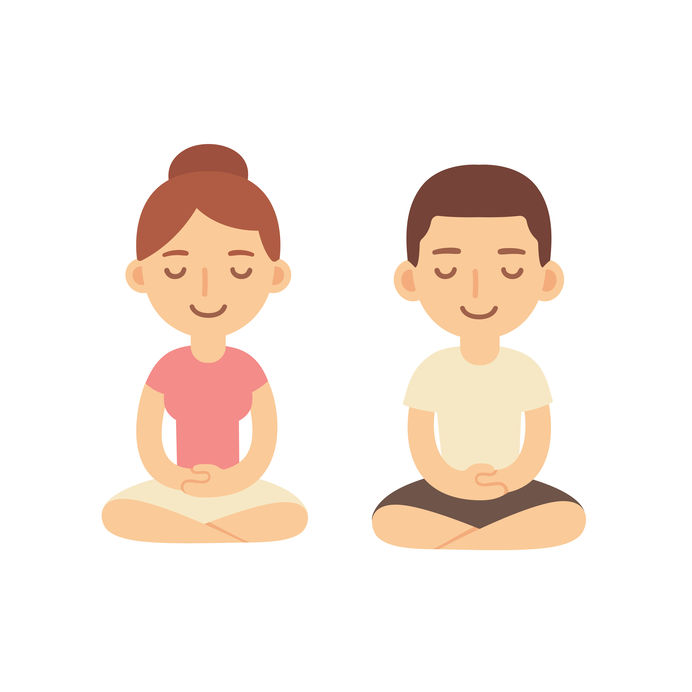Background: Meditation’s health benefits
Meditation and mindfulness practices have become more accepted in Western cultures since the late 1990’s. There are several reasons for this. A primary one is the research and writing of Jon Kabat-Zinn, a scientist who adapted a Southeast Asian Buddhist meditation practice for a Western audience.
His work focuses on a practice called mindfulness meditation. Kabat-Zinn initially, in the late 1970s, focused on patients suffering from chronic pain. His research showed promising results for these patients. His work led to an expansion in research on what other conditions improve with mindfulness meditation. In the following years, studies showed that mindfulness and meditation produce benefit for those suffering from other conditions as well. These include hypertension, insomnia, as well as various anxiety and mood disorders.
These scientific advancements, along with more open societal attitudes toward meditation, led to an explosion in meditation and mindfulness-based practice. People understood that these practices were an effective way to maintain emotional health and to manage stress. Around the same time, yoga also became much more accepted as a healthy habit.
People came to see meditation as analogous to physical exercise — challenging to undertake, but leading to continued benefits with regular practice. (Remember, it may seem like we’ve always known physical exercise is an important healthy habit, but as a popular belief in the U.S. it only dates back to the years after World War II! It’s hard to believe that as recently as the 1930’s smoking was seen as harmless, exercise routines for typical adults were occasional golf or bowling, and meditation and yoga were seen as exotic trappings of the East.)
Concerns about negative meditation experiences
With its increased popularity have come concerns: what about unpleasant or scary meditation experiences? Does it intensify anxiety, or cause other psychiatric problems? In some Christian quarters there are even worries about opening the door for demonic influence. These fears were often based on anecdotal evidence.
To provide a more scientific understanding of the negative effects of meditation, noted meditation researcher Dr. Willoughby Britton of Brown University and her colleagues conducted a study that was published in PLOS One in 2017. The media have portrayed the study as a cautionary tale about previously unreported dangers. The study interviewed sixty experienced meditators about their unpleasant meditation experiences. These experiences were quite diverse, and included agitation, depression, changes in perception, and even hallucinations.
Why these concerns are overstated
– The study did not use a representative sample
It is tempting to think, “a study of meditators revealed they have a lot of negative experiences. I guess meditation must be dangerous.” However, this type of reasoning excludes some important aspects of the study. Perhaps the primary one is the fact that the research team recruited meditators who reported having negative experiences with meditation — it was not a random sample of meditators. An exception to the concerned commentary included an insightful take from Britain’s NHS website, which astutely notes that:
“The study only included people in Western countries who meditated within one of three Buddhist traditions, and — importantly — who’d had negative experiences. So the numbers of people in the study reporting, for example, fear, is only representative of people who’d said they had a negative experience through meditation, not of all people meditating.”
Does this mean that the study is worthless or misleading? Absolutely not! The study was very transparent in its intention and scope. It succeeds in accomplishing its aim of documenting specific negative meditation experiences. However, we cannot draw conclusions from the study that are not warranted from its results.
– Concerns ignore fact that meditation’s benefits likely outweigh potential for harm
Concluding “a study of meditators revealed that negative meditation experiences are common. I guess meditation must be unsafe” would be shortsighted. How many positive things in life involve negative experiences? Having a relationship end doesn’t mean that dating is a bad idea. Having a bad professor doesn’t mean that college was a bad idea. How many rewarding things in life are completely free of unpleasantness? Many of the research subjects continued their meditation practice after having these experiences. This suggests that they may have found them to be speed bumps rather than roadblocks.
– The study doesn’t establish what caused the negative meditation experiences (nor claim to)
It is difficult in a study of this sort to draw conclusions about what factors caused which problems. As the study authors point out, the best way to do that is to use a randomized clinical trial (RCT). Such a study is typically large and expensive. Perhaps an RCT will be done at some point that will document the same meditation experiences that this study examined. Such a study would be a great contribution to our understanding of meditation’s effects. Given the results of the present study, we cannot dismiss the possibility that meditation caused the experiences reported by the meditators.
Should you be concerned about having bad meditation experiences?
Meditation is generally a safe practice that produces many scientifically documented healthful effects, especially for those with mood or anxiety disorders. It has positive impact even for many without mood or anxiety disorders. Meditation also has been associated with some negative experiences, many of which were documented in the recent study. However, based on what we know about meditation and its effects, you are more likely to experience the healthful effects of meditation than to be have negative meditation experiences described in the study.
– Mindfulness meditation resources
To learn more about mindfulness meditation in New York, contact the Mindfulness Collaborative. Outside the New York area, consider finding a class in Mindfulness-Based Stress Reduction or reading the work of Jon Kabat-Zinn or other authors (e.g., Jeffrey Brantley or Liz Roemer and Sue Orsillo).
Subscribe to the Manhattan Center for Cognitive-Behavioral Therapy blog!









